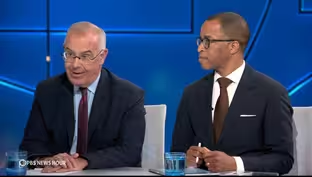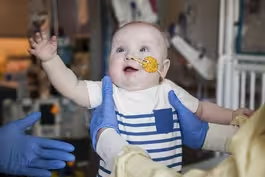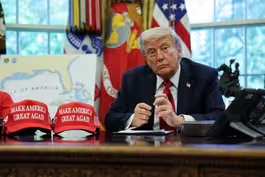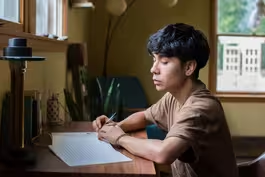
Russia-Ukraine talks fall flat with few signs of progress
Clip: 5/16/2025 | 8m 45sVideo has Closed Captions
Russia-Ukraine peace talks fall flat with few signs of progress
In highly anticipated peace talks, Russian and Ukrainian officials agreed to exchange 1,000 prisoners, the war’s largest swap. While they agreed to keep talking, there was no breakthrough for peace and the two sides seemed even further apart. Nick Schifrin reports and Amna Nawaz speaks with former State Department official Andrew Weiss for perspective on the state of negotiations.
Problems playing video? | Closed Captioning Feedback
Problems playing video? | Closed Captioning Feedback
Major corporate funding for the PBS News Hour is provided by BDO, BNSF, Consumer Cellular, American Cruise Lines, and Raymond James. Funding for the PBS NewsHour Weekend is provided by...

Russia-Ukraine talks fall flat with few signs of progress
Clip: 5/16/2025 | 8m 45sVideo has Closed Captions
In highly anticipated peace talks, Russian and Ukrainian officials agreed to exchange 1,000 prisoners, the war’s largest swap. While they agreed to keep talking, there was no breakthrough for peace and the two sides seemed even further apart. Nick Schifrin reports and Amna Nawaz speaks with former State Department official Andrew Weiss for perspective on the state of negotiations.
Problems playing video? | Closed Captioning Feedback
How to Watch PBS News Hour
PBS News Hour is available to stream on pbs.org and the free PBS App, available on iPhone, Apple TV, Android TV, Android smartphones, Amazon Fire TV, Amazon Fire Tablet, Roku, Samsung Smart TV, and Vizio.
Providing Support for PBS.org
Learn Moreabout PBS online sponsorshipGEOFF BENNETT: Welcome to the "News Hour."
Today, senior Russian and Ukrainian officials did something they have not done in more than three years, sat across from each other and talked.
Since their last negotiation, more than one million people have been killed or wounded.
AMNA NAWAZ: Today, the two sides agreed to exchange 1,000 prisoners.
That would be the war's largest swap.
And they agreed to keep talking.
But, beyond that, there were no breakthrough.
And in some respect, the two sides seem even further apart than when they started.
Nick Schifrin begins our coverage.
NICK SCHIFRIN: Today in Istanbul, foes finally faced each other.
Senior Ukrainian Russian officials haven't been this close in nearly 1,200 days.
But, by the end of the meeting, they have never been further apart.
HEORHII TYKHYI, Ukrainian Foreign Ministry Spokesman: There were a number of things that, of course, were unacceptable.
But again, the Ukrainian delegation took it with a very calm posture.
NICK SCHIFRIN: The last time Ukraine and Russia negotiated, in March 2022, in the exact same location as today's talks, Russia demanded caps on Ukraine's military, the ending of Western support, the end of Ukraine's NATO dreams, and the dissolution of Volodymyr Zelenskyy's government.
Today, Russia reportedly expanded its demands to include Ukrainian withdrawal from four regions that are under partial Russian control, Zaporizhzhia, Donetsk, Kherson, and Luhansk, and buffer zones in other provinces of Sumy, Kharkiv, and Dnipropetrovsk.
Russian negotiator Vladimir Medinsky said today that, compared to 2022, Moscow wanted more.
VLADIMIR MEDINSKY, Head of Russian Delegation (through translator): It was a little bit tougher in relation to the realities on the ground.
NICK SCHIFRIN: The two sides did agree to the largest prisoner release of the war, and Russia said it would consider a Ukrainian request for a Zelenskyy-Vladimir Putin meeting.
VLADIMIR MEDINSKY (through translator): We agreed that each side will present its vision of a possible future cease-fire and spell it out in detail.
NICK SCHIFRIN: But Russia continues to reject U.S., Ukrainian, and European requests for a 30-day cease-fire.
HEORHII TYKHYI: You all know that this is how it works.
You first make guns silent, and then you talk.
VLADIMIR MEDINSKY (through translator): As a rule, as Napoleon said, war and negotiations take place simultaneously.
NICK SCHIFRIN: Zelenskyy and the European coalition of the willing who spoke to President Trump today pushed back.
KEIR STARMER, British Prime Minister: The Russian position is clearly unacceptable, and not for the first time.
JEFFREY EDMONDS, Center for Naval Analyses: I'm just not very optimistic as to where this is going to go, because I don't think Putin has changed his strategic goals in Ukraine, of at least a neutral Ukraine, demilitarization, Zelenskyy gone.
NICK SCHIFRIN: Jeff Edmonds is a former defense White House and CIA analyst on Russia and Europe, now at the Center for Naval Analysis.
JEFFREY EDMONDS: The Russians, despite the massive amounts of manpower they have wasted on this war, are meeting their recruitment goals.
And so they can stay in this fight longer.
I think they will make some progress.
They believe they're able to negotiate from a stronger position because they're winning.
NICK SCHIFRIN: Those battlefield advances, despite enormous losses, reinforce Putin's belief he can achieve maximalist goals.
But Ukraine has adjusted and can likely hold the line against Russian troops, says Edmonds.
JEFFREY EDMONDS: They are making incremental improvements, and there's talk of another offensive coming.
There's talk of more troops being built up on the Russian side.
But the Ukrainians have learned I think in some sense from their failed offensive in 2023 how effective defensive measures can be.
And so I know that they're concentrating on that.
So I don't see a big breakthrough coming in any region.
NICK SCHIFRIN: And so, most likely, the two sides will continue to fight and negotiate to stalemate.
For the "PBS News Hour," I'm Nick Schifrin.
AMNA NAWAZ: For a perspective on the state of play of the negotiations between Russia and Ukraine, we turn now to Andrew Weiss, a former State Department official who served in the George H.W.
Bush and Clinton administrations.
He's now the vice president for studies at the Carnegie Endowment for International Peace.
Andrew, always great to see you.
ANDREW WEISS, Carnegie Endowment for International Peace: Great to see you.
AMNA NAWAZ: So those peace talks today wrapping just shy of two hours, a historic prisoner swap, but no cease-fire, no major breakthroughs.
What do you see here?
Is this progress?
ANDREW WEISS: This process is about an audience of one.
Both sides are trying to appeal to President Trump and avoid being blamed for the process not going anywhere.
So the Ukrainians have gone great, far - - taken a lot of steps to agree to an unconditional 30-day cease-fire, to agree to meet with the Russians, and to sort of play nicely with this administration.
The Russians, who have given no ground, and, in fact, as you heard from Nick Schifrin just a moment ago, are actually expanding their demands, also want to look like they're nice people and that they are serious about peace.
They're not.
And as we heard just a moment ago, they think time's on their side.
AMNA NAWAZ: So we know Vladimir Putin was not at these meetings, and you heard President Zelenskyy say that that is a sign that Putin is not serious about wanting a cease-fire.
You agree with that assessment?
ANDREW WEISS: Yes.
No, the Russians at this point have very maximalist goals.
Those goals amount essentially to wiping Ukraine off the map.
That's what they want.
They want Ukraine to disappear and to become forcibly reintegrated into Russia's orbit.
The Ukrainians are not in any position where they're desperate for a deal.
And I think this White House in part is hampered in its peacemaking efforts because they have a misunderstanding of where things are on the ground.
They believe Ukraine's in a dire situation desperate for a deal, and they think that the Russians, if the United States were to cut off military assistance again to Ukraine, could roll over Ukraine in short order.
Both those, unfortunately, are not the case.
Ukraine is in a bad situation, but the defense is inherently favored in this war.
They have been able to expand their own defense production capabilities.
So a lot of what they need, drones, artillery, things like that, they can now produce at home.
They're seriously in need of continued U.S. military and intelligence support.
They also have some niche important requirements, including for air defense, that they can't replace on their own.
AMNA NAWAZ: You heard this audience of one, as you referred to him, President Trump, yesterday, as he was traveling in the Middle East, say that nothing is going to happen until he and Putin speak directly.
Do you agree with that?
And what do you think would come of that kind of meeting?
ANDREW WEISS: The Ukrainians and the Europeans are really worried that any bilateral agreement between the United States and Russia could be rammed down Ukraine's throat and rammed down Europe's throat.
So there's a desire to make sure that the United States president doesn't set off in a spontaneous way, as we have seen him do in other foreign policy matters, where he sort of runs around, makes spontaneous decisions, does things on the fly.
This is a very dangerous, delicate moment for the Ukrainians.
They don't want to see a peace deal that's agreed behind their backs.
At the same time, Donald Trump, I think, has been bending over backwards to avoid putting blame on Vladimir Putin.
So, asking for a meeting is now just the next sort of way of kicking the can and avoiding the moment of decision that Putin - - that Trump had promised us, where he said, if I can't get this settled within my first 100 days, I'm going to walk away.
That's the moment we're waiting for Trump to reveal, what walking away means.
AMNA NAWAZ: When it comes to the U.S. involvement here, though, I want to share with you something the former U.S. ambassador to Ukraine Bridget Brink published just today in this op-ed in The Detroit Free Press.
She basically said she resigned last month because of Trump's foreign policy after serving three years in Ukraine.
She wrote this: "I cannot stand by while a country is invaded, a democracy bombarded and children killed with impunity.
I believe the only way to secure U.S. interests is to stand up for democracies and to stand against autocrats.
Peace at any price is not peace at all.
It is appeasement."
Is President Trump here pursuing a policy of appeasement?
ANDREW WEISS: I think he is.
And I think the risk is that the policy that we had in place when Donald Trump became president focused on unity with the Europeans, common cause with the Ukrainians, and showing the Russians that they can't get what they want and that we would build leverage over time to get them to see that this was a hopeless goal, that they were never going to get Ukraine back.
At this point, Donald Trump has cut off military aid for a brief period for the Ukrainians, cut off intelligence support.
He's blown up a lot of our key relationships with the Europeans, treating them as more as adversaries than as U.S. allies.
Those are all, I think, making Putin confident that, even if the negotiation fails, he still comes out ahead.
AMNA NAWAZ: Andrew Weiss, thank you for your time.
Always great to speak with you.
ANDREW WEISS: Thank you.
Brooks and Capehart on Trump's Middle East policy shifts
Video has Closed Captions
Clip: 5/16/2025 | 10m 41s | Brooks and Capehart on Trump's Middle East policy shifts (10m 41s)
Gene editing treatment helps child born with rare disorder
Video has Closed Captions
Clip: 5/16/2025 | 6m 43s | Breakthrough gene editing treatment helps child born with rare disorder (6m 43s)
How the Trump family could be profiting off the presidency
Video has Closed Captions
Clip: 5/16/2025 | 9m 12s | Trump business deals revive questions about his family profiting off the presidency (9m 12s)
Ocean Vuong explores chosen family and kindness in new novel
Video has Closed Captions
Clip: 5/16/2025 | 6m 54s | In 'The Emperor of Gladness,' Ocean Vuong explores chosen family and acts of kindness (6m 54s)
Providing Support for PBS.org
Learn Moreabout PBS online sponsorship
- News and Public Affairs

FRONTLINE is investigative journalism that questions, explains and changes our world.

- News and Public Affairs

Amanpour and Company features conversations with leaders and decision makers.












Support for PBS provided by:
Major corporate funding for the PBS News Hour is provided by BDO, BNSF, Consumer Cellular, American Cruise Lines, and Raymond James. Funding for the PBS NewsHour Weekend is provided by...



